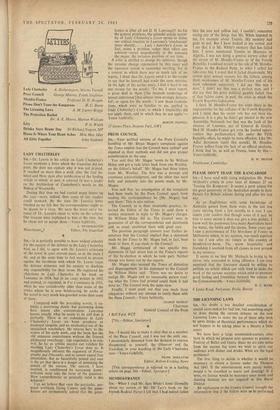SIR,—It is perfectly possible to have wished ardently for the
success of the defence in the Lady Chatterley trial, as I did, to agree with Dr. Leavis's criticisms of the novel in your current issue, as in the main I do, and at the same time to feel moved to protest against the harshness with which Dr. Lcavis treats the defence witnesses and his anxiety to disclaim any responsibility for their views. He registered his objections to Lady Chatterley in his book on Lawrence in 1954, but in an essay written in 1932 and printed, or reprinted, in For Continuity in 1933, when he was considerably older than some of the critics whom he is now belabouring, he spoke of the novel in very much less guarded terms than some of them: Compared with the preceding novels, it ex- hibits a narrowing down: but narrowing down here means also concentration. Lawrence knows exactly what he wants to do and does it perfectly. There is no redundancy in Lady Chatterley's Lover, no loose prophecy or passional exegesis, and no mechanical use of the specialised vocabulary. He returns here to the scenes of his early work, and the book has the old sensuous concreteness without the fevered adolescent overcharge : ripe experience is in con- trol. So far as artistic success can validate his teaching Lady Chatterley's Lover does so. It magnificently enforces the argument of Porno- graphy and Obscenity, and so cannot expect free circulation. But so beautifully poised and sure is the art that there is a danger of mistaking the nature of the success. The success, I have implied, is conditioned by narrowing down: criticism must take the form of the question: How comprehensive or generally valid is this solution?
Can we believe that even the particular, per- sonal problems facing Connie and the game- keeper are permanently solved (for the game- keeper is after all not D. H. Lawrence)? As for the general problems, the splendid artistic matur- ity of Lady Chatterley's Lover serves to define our critical reaction to Lawrence's 'conclusions' more sharply. . . . Lady Chatterley's Lover, in fact, states a problem rather than offers any solution—states magnificently in the concrete the major, the inclusive problem of our time. A critic is entitled to change his opinions, though the extreme change represented by this essay and the Spectator article is somewhat startling, but in a context in which there was so much talk of in- tegrity, I think that Dr. Lcavis owed it to the reader to say that he himself had made the same mistake. In the light of the earlier essay, I find it hard to see any excuse for the words: 'To me, I must report, a great deal in them ['the insistent renderings of sexual experience.] has always been strongly distaste- ful.; or again for the words : 'I saw those formula- tions, which were so familiar to me, applied to Lady Chatterley's Lover, to which I (explicitly) did not apply them, and to which they do not apply:— Yours faithfully,






































 Previous page
Previous page